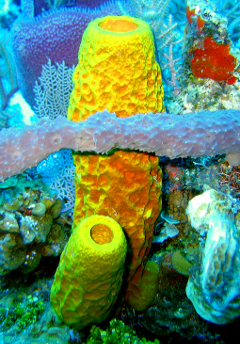Sponges suffer in climate shift
 Scientists from UNSW have made a significant discovery regarding the impact of climate change on sea sponges.
Scientists from UNSW have made a significant discovery regarding the impact of climate change on sea sponges.
These ancient creatures, essential to marine ecosystems, provide shelter, food, and nutrient recycling while hosting microbes with potential medical applications.
A new study has found that when tropical sea sponges are exposed to warmer temperatures, they lose a crucial microbe, leading to tissue death.
By increasing the temperature by 3°C, researchers observed one vital microbe abandoning the sponge, potentially causing tissue poisoning.
Dr Emmanuelle Botte, lead author of the study, warned that sponge species may not be as resilient to climate change as previously thought, highlighting the breakdown of symbiosis between sponges and their microbes as a potential cause for decay.
“Sponges date back 545 million years,” says Dr Botte.
“They live in symbiosis with microbes, which fulfil vital roles for the sponge: they recycle nutrients, produce energy and defend the sponge against predators and diseases. Some microbes even detoxify the sponge’s body. They are a bit like the liver and kidneys of the sponge.
“We've already seen marine heatwaves wipe out sponges in the Mediterranean and impact sponges in New Zealand.
“We are seeing that some sponge species are not as resistant as we first thought to climate change. This research reveals that the breakdown of the symbiosis between the host and its microbes could create a chemical imbalance in the sponge and cause its decay.”
The research team, in collaboration with Heidi Luter and James Bell, underscored the risk that climate change poses to microbial diversity, emphasising its impact on unassuming animals and the microbes they host.
The findings shed light on the vulnerability of sponge populations worldwide and the urgent need for conservation efforts.
Furthermore, sponges and their associated microbes play a crucial role in drug discovery, as they produce valuable molecules with pharmaceutical and commercial potential.
The full study is accessible here.








 Print
Print